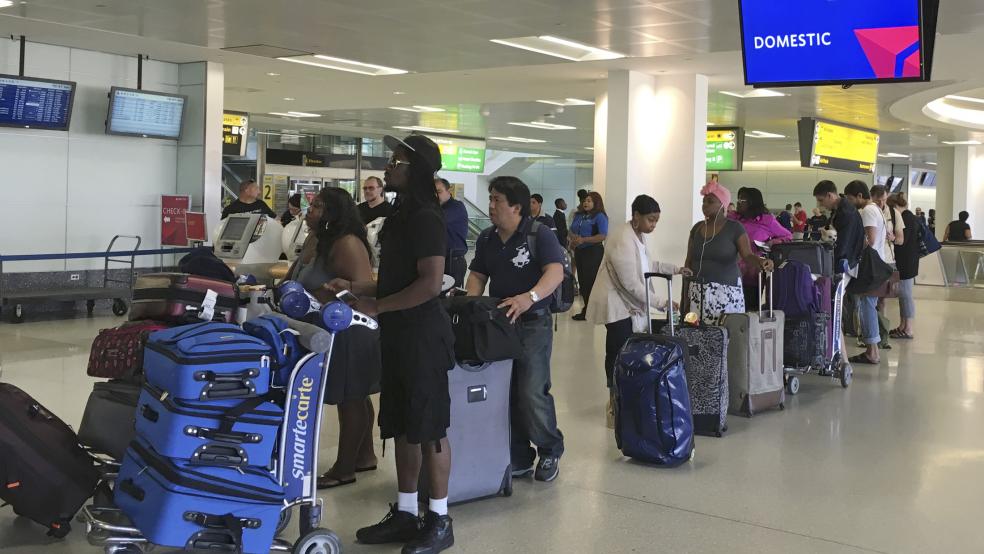If you set aside all the Trumping and cupping, the big story this week concerned Delta Airlines, which stranded hundreds of thousands of travelers worldwide after an internal electrical outage caused a computer malfunction that crashed the company’s entire system.
It was bad enough when the outage grounded 1,000 flights on Monday, but the problems continued with over 1,000 additional cancellations on Tuesday and Wednesday, and even another 25 on Thursday, as the airline and passengers untangled their schedules. So one outage roiled the nation’s second-largest airline for an entire week. Fortunately, nobody travels in the summer.
Related: America’s Best and Worst Airlines of 2016
This should actually sound familiar, because it’s the third major computer malfunction of a U.S. airline in the past year. In July, Southwest Airlines had to cancel 2,300 flights over four days because of a similar IT snafu, caused by a single router failure. United Airlines had a computer issue that grounded 4,900 flights for more than an hour, which rippled through its system and caused missed connections and delays. And if you go back to 2013, American Airlines had its own system-wide crash, affecting hundreds of flights.
Considering that we have four major airlines in America controlling 85 percent of all domestic capacity, that’s pretty much a clean sweep.
Why does this continue to happen? First of all, airline IT systems appear to run on the equivalent of an Apple IIc instead of a MacBook Pro. Despite a spate of mergers in the industry — Delta/Northwest, American/US Airways, United/Continental, Southwest/AirTran — none of the back-end was upgraded. These mergers were actually sold on the basis of creating “efficiencies,” specifically from integrating computer systems. But the efficiencies never work out, and the integration costs always end up higher than the initial estimate.
Related: America’s Favorite Airlines, Ranked
Not only that, but what typically happens with IT is that one old legacy system gets patched to interface with another old legacy system, inevitably creating unforeseen problems. As Diana Moss of the American Antitrust Institute has shown, computer meltdowns become more prevalent after mergers, as a larger system of reservations and flight departures and crew schedules gets piled onto creaky computer networks dating back to the 1990s. Even Delta CEO Ed Bastian admitted this week that their IT investments may not “have been in the right place.”
The nature of airline travel means that any outage, even affecting a limited number of flights, can cascade across the country. Lack of takeoffs mean that planes don’t reach hub airports, gates with dormant airplanes become unavailable for arriving flights, connections get missed or delayed and crews can’t reach departing flights. So it would take days to reconcile the schedule under the best conditions.
However, in America’s airline oligopoly, these problems get magnified, for the simple reason that individual airlines service more flights. In many cities there’s little or no alternative to flying the dominant carrier. By getting bigger, the airlines become less resilient, less able to handle malfunctions without them impacting large swaths of the travel system.
Related: How Monopolies Are Crushing U.S. Workers and Consumers
Take the United glitch last year. On the same day last July, the New York Stock Exchange had a major computer malfunction, shutting down trading. But because there are so many exchange competitors, trade volumes did not drop as a result, as investors had options. When United went down, passengers did not have the same luxury. So they sat and waited.
Furthermore, because airlines have thinned out their schedules to ensure full flights all the time, there’s no way to place passengers on another flight to the same destination, even if there was one. That cost-cutting, profit-maximizing measure makes the system far less flexible. In addition, U.S. airlines often refuse to cooperate with one another to rebook passengers on their competitors’ airlines, as they used to do. Southwest in particular doesn’t offer other airlines a discount for rebooking, so the competitors resist accommodating passengers. Delta broke its rebooking agreement with American last year, after demanding higher rates.
The biggest reason these kinds of catastrophes proliferate is that the consumer has no real alternative to express her frustration. Yes, between offering free re-ticketing and hotel stays and $200 travel vouchers (which is less than many passengers are entitled to), Delta stands to lose millions of dollars from this week’s incident, just as Southwest did last month. But what would really cost Delta is if consumers voted with their feet and boycotted the airline. And with our virtual airline monopoly, the consumer simply cannot do that.
Related: 6 Ways to Get Free Flights Using Your Airline Rewards Card
This affects spending priorities, with airlines eager to upgrade their fleet and their lounges but neglecting the back end that makes everything work. There’s no incentive to provide high-quality services if you’re the only game in town. So you deliver a little glitz to bring in the business class folks — and relentlessly cut costs everywhere else.
The situation at the airlines is only a symptom of a larger crisis of market concentration across practically every sector of the economy. The Institute for Local Self-Reliance just released a report showing the sharp decline in startups and independent businesses in recent years, squeezed out by large corporations using their market power. This causes price increases, quality deterioration and wealth inequality as the biggest corporations hoard all the cash, and a breakdown of democracy as those businesses use their power to influence the political system.
We actually have a choice here, rooted in antitrust laws a century old designed to preserve competition and break up monopolies. Those laws have too rarely been exercised in the past few decades, leading to the extreme concentration we have today. The next administration needs to get much tougher on antitrust policy. Otherwise, you’ll probably find yourself sometime in the future sitting on the floor of your local airport terminal, wondering if you’ll ever reach your final destination.






